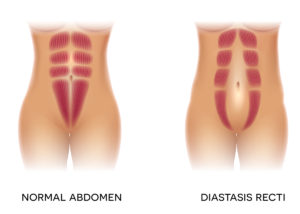The “six-pack” muscles (rectus abdominis muscles) are pushed apart during pregnancy, and the thin band of connective tissue between them (linea alba) stretches. That muscle separation is called diastasis recti or rectus diastasis and may affect pelvic floor function and lower back pain. Dr. Dumanian has published the finding that not only does the linea alba stretch but the rectus muscles themselves widen and thin for each of the first two pregnancies. Dr. Gregory Dumanian offers two different types of abdominal wall tightening for diastasis recti repair depending on the severity of the condition.
Dr. Dumanian created a mesh suture for women with standard rectus diastasis—some stretching, but not to the point of having no abdominal wall tone. Cleared by the FDA and now with global sales, tissues grow into the mesh suture to improve the strength of the repair. It is placed exactly like a standard suture to bring the muscles back together in the midline. For ladies (and men) with severe rectus diastasis and stretched out muscles with so-called “floppy abdomens,” Dr. Dumanian created a unique procedure called a “mesh abdominoplasty” to restore quality of life and abdominal muscle tone. Dr. Dumanian has published extensively on this procedure as well.
How Does Diastasis Recti Affect Quality of Life?
Women (and men) with abdominal muscle separation may have a lack of core strength, which may lead to or worsen low back pain and make certain movements more challenging.
A 2020 interview study of 19 women found that diastasis recti with at least a two-finger width of separation caused several issues. The interviewed women reported avoiding specific abdominal movements because of the physical instability of their midsection, and dissatisfaction with their body appearance affected their self-confidence and clothing choices. Diastasis recti affected their everyday lives and activities, and several women said they felt weak, fragile, or “wobbly.” They did not care as much about the loose skin left from pregnancy but struggled with the loss of abdominal strength. One woman reported difficulty carrying a laundry basket because it “feels like the insides will be falling out…”
A 2019 systematic review published in Physiotherapy on the link between diastasis recti and musculoskeletal functions evaluated the associated pain and changes in quality of life. Researchers included the data from 12 studies and 2,242 patients. They found no significant association between abdominal muscle separation and lumbopelvic pain or urinary incontinence. However, they reported the width or severity of the muscle separation could be connected to severe low back pain, abdominal muscle strength, and health-related quality of life.
How Mesh Abdominoplasty Corrects Severe Abdominal Muscle Separation
The abdominal muscles typically have about one finger separation, but can stretch up to 10 centimeters in severe instances. For women, this separation tends to happen around the navel during pregnancy, while men may experience the condition in the upper abdomen starting in the fourth decade of life. While the majority of men are heavier than average with rectus diastasis, even slender men can develop the condition, perhaps due to a particular shape of the rib cage.
Mesh abdominoplasty is a unique surgical approach pioneered by Dr. Dumanian and used for the most severe cases of rectus diastasis. His technique reinforces the entire zone behind the rectus muscles to bring them together and to physically narrow the stretched muscles themselves. The mesh extends from the lower end of the breastbone (sternum) to the pubic bone. The operation is durable. When a similar operation is performed for incisional hernias of the linea alba, Dr. Dumanian has data that no hernias develop even with 7.5 years of follow-up in almost 100 cases. Dr. Dumanian’s mesh abdominoplasty reduces the recurrence of diastasis recti and ensures good blood flow for excellent healing. It makes sense to see an innovative plastic surgeon with hernia experience for the repair of both mild and severe rectus diastasis.
If you have abdominal muscle separation, contact Dr. Dumanian to learn more about mesh abdominoplasty. Schedule a consultation with our board-certified plastic surgeon at Northwestern Plastic Surgery in Chicago, Illinois, at (312) 695-6022.


